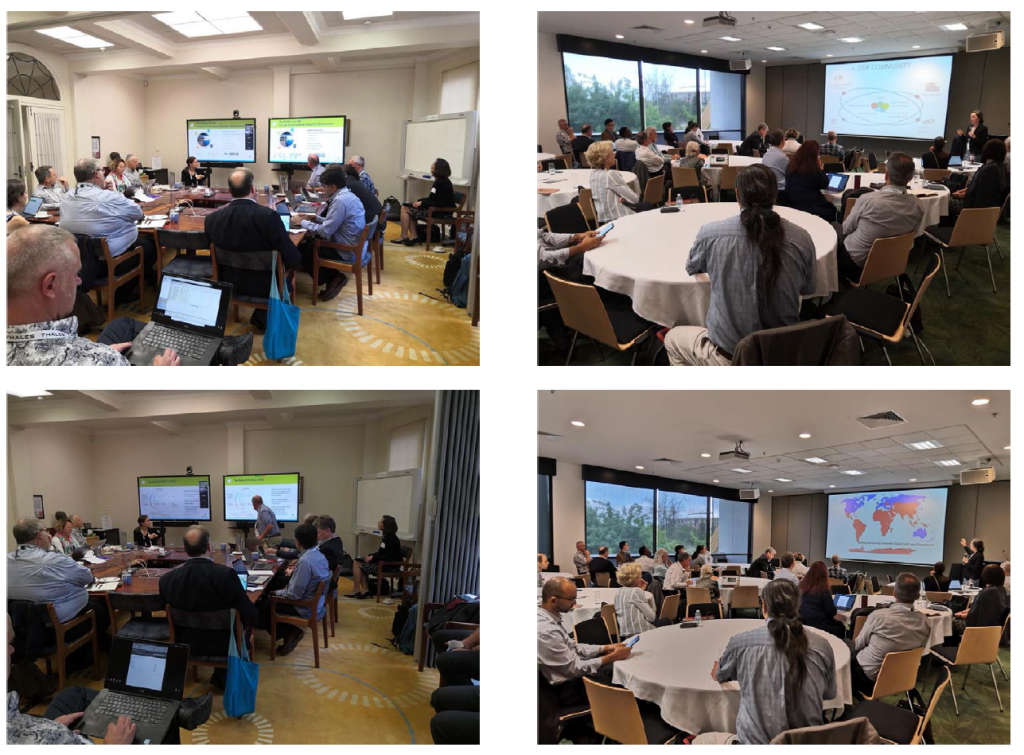- Erin Robinson – Earth Science Information Partners (ESIP)
- Dr Steven McEachern – Australian Data Archive, ANU
- Alena Rybkina – Committee on Data of the International Science Council (CODATA)
- John Broome – Committee on Data of the International Science Council (CODATA)
- Francoise Perlman – FourBridges
- Dr Ben Evans – National Computational Infrastructure (NCI)
- Magdalena Brus – Integrated Carbon Observation System (ICOS) European Research
- Infrastructure Consortium (ERIC), ENVRI
SUMMARY:
- Building on the FAIR principles, this session explored a series of pilots and initiatives currently underway to develop data infrastructures and to increase collaboration and access to the increasing surge of data currently being captured globally. There has been some headway in the global north, but less in the global south.
- Collaboration was identified as a major obstacle to increase cross-institutional, multi-disciplinary and international access to de-fragment the data landscape.
- By improving the access and collaboration across disciplines, it will be possible to better address socioeconomic problems such as responses to infectious diseases, disaster risk reduction and building resilient cities.
- Using the FAIR principles to unify data across a range of sources and data types requires the development of pilots to test how this unification and inter-operability of data would be undertaken.
- It is important to recognize how different disciplines can offer insights to different data problems or questions, but still work together to address larger societal problems.
- As the amount, quality and type of data available grows rapidly, it is equally important to ensure that the data infrastructure grows with it in order to process it. At the moment, the infrastructure is somewhat lagging behind.
- By developing and investing in the data infrastructure, it is possible to make the data easier to access and use, and make the data smarter and better targeted to the problems it is used to address. However, there are challenges for business models, societal models and policy/governance issues. Of serious concern is that the people working on the policy around data and data infrastructure cannot keep up or understand the challenges.
- While there are many groups working towards de-siloing data and data infrastructure, there needs to be an umbrella approach to avoid duplication of efforts and unify the approach. CODATA is leading the design and execution of a Decadal Programme that will address the data interoperability challenge identified in the International Science Council’s 2019-2021 Action Plan. The Decadal Program is currently being developed to address this issue and is seeking expressions of interest to help in its development.
- The session brought together individuals from around the world and many different organisations who are interested in addressing this concept of a multi-disciplinary, democratization of data.
- During discussion there was some concern regarding ethical issues around data accessibility and sharing that still needs to be addressed.
QUOTES: John Broome (CODATA): ‘Partnerships will be critical. Clearly no one organisation can hope to achieve the overall goal.’
ABSTRACT:
Accessing and integrating data from heterogeneous sources is a significant barrier facing evidence-based responses to global grand challenges. To address this ISC-CODATA is preparing an international, coordinating research program; ESIP has developed a community of practice around earth science data standards; and ENVRI aims to align and share FAIR compliant in-situ data and services. This workshop will 1) invite the GEO community to engage with these initiatives; 2) examine specific challenges relating to data accessibility, interoperability and reusability (FAIR); and 3) examine these issues around a set of pilot case studies, including infectious diseases, resilient cities and disaster risk reduction.
Grand challenges need to access and integrate data from many different sources. Discovery and interoperability mechanisms are frequently suboptimal. Time and space is usually a key to integration, and remote sensing and in-situ Earth observation data play a crucial role. The session will allow detailed exploration of the issues in relation to case studies of significance to the GEO community. The workshop will explore the applicability and potential of the FAIR principles, ‘fitness for use’ criteria, Operational Readiness Levels, alignment of metadata specifications, and data cubes to contribute towards the solutions needed to assist data integration.
PRESENTATION:
Please find the presentation here.
Organizers
- International Science Council – ISC
- CODATA – Committee on Data of the ISC
- ESIP – Earth Science Information Partners (US)
- ARDC – Australian Research Data Commons
- The National Committee for Data in Science (NCDiS) of the AAS – Australian Academy of science
- AuScope
- NCI – National Computational Infrastructure (Australia)
- CSIRO (Australia)
- The European Environmental Research Infrastructure Community (ENVRI
Contact
John Broome (CODATA), Erin Robinson (ESIP) (johnhbroome@gmail.com, erinro


